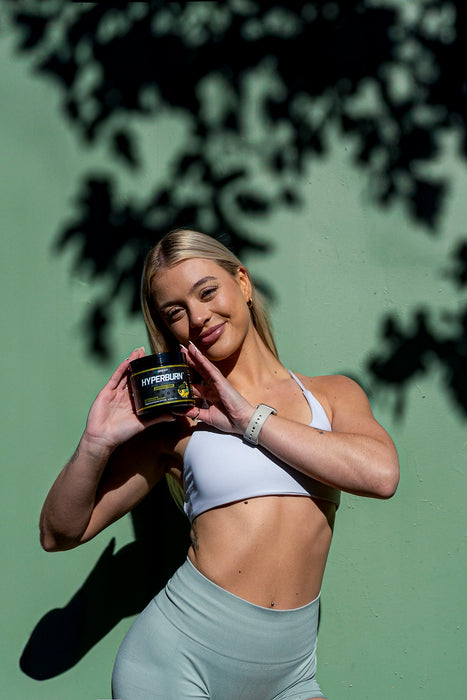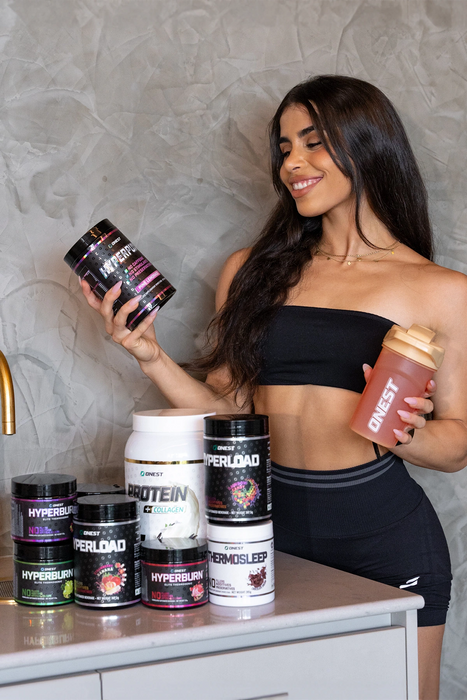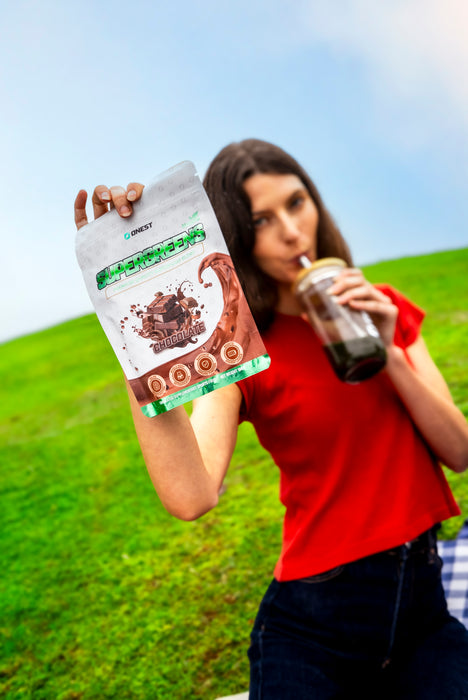JANUARY 27, 2021
7 SUPERFOODS THAT PROTECT YOUR IMMUNITY,WAISTLINE AND HEALTH DURING WINTER
Are you worried about making it safely through the flu season this year? Concerned that stress and inactivity might contribute to unwanted belly fat? Want to stay as vibrant and healthy as possible during the winter months?
Then I’m glad you’re here!
There is one approach that has been shown to protect your immunity, contribute to a slender waistline and encourage well being: Nutrition! That’s where superfoods come in… Super, of course, meaning “Powerful,” “High grade” and “Exceeding the norm”.
These foods are nutrient-rich and contain potent ingredients that nourish the body and mind. When we talk about superfoods there are 7 that rise to the top of the stack: Wheatgrass, Spirulina, Spinach, Blueberry, Acai, Kale and Broccoli.
Let’s take a look…
Wheatgrass
Wheatgrass, the young grass of the common wheat plant, is bursting with nutrients that enhance immunity and function. These include Amino acids, Chlorophyll, and Enzymes, Minerals including Calcium, Phosphorus, Magnesium, Potassium, Zinc and Vitamins from A, C, E to the B complex.
This “living” food supercharges anti-inflammatory messengers, reduces damaging free radicals, and protects our white blood cells. Each of these aspects are key to a robust immune system.
A study published in the journal Molecules found Chlorophyll, sometimes referred to as green blood because of its healing goodness, is even able to “inhibit or reverse multi drug resistance in… bacteria.”
Chlorophyll can kill harmful bugs where strong medical drugs fail.
Spirulina
Spirulina is an organic matter composed of Cyanobacteria, named for its blue-green color. While we tend to think of bacteria as bad, this notion is far from accurate.
As such, Spirulina has many health benefits. Interesting, research has shown that this mass of microbes helps us to fight harmful bugs.
How?
Imagine a game of PacMan. This adored character acts like your body’s natural killer (NK) cells, chomping through invaders (ghosts) to protect your body (the game). In-game Spirulina would promote his ability to chew.
In your body, this type of Cyanobacteria multiplies the activity of NK cells. Not only that, it secretes messengers that seduce other immune cells to mount a stronger defense.
There is another potential benefit.
Obesity is related to gut dysbiosis; an imbalance between the good and bad gut bugs. Spirulina appears to upgrade the growth of healthy intestinal Microbiota (the good bugs). In doing so, this may have benefits for your waistline...
Anointing Spirulina a two-fold winner in the health stakes.
Spinach
Fresh Spinach should be on everyone’s plate. This functional food packs a powerful nutritional punch. But while we here at Onest advocate and eat this gorgeous leafy green often, research shows that most people don’t.
Why should you up your spinach intake?
The journal article Functional properties of Spinach (Spinacia oleracea L.) Phytochemicals and Bioactives put it succinctly. This common salad green is:
Able to (i) Scavenge reactive oxygen species and prevent macro molecular oxidative damage, (ii) Modulate expression and activity of genes involved in Metabolism, Proliferation, Inflammation, and Antioxidant defense, and (iii) Curb food intake by inducing secretion of satiety hormones.
In essence, Spinach protects you against free radical damage. It boosts both your metabolism and your immune defense. And it stops you from feeling hungry, which helps you to naturally and easily eat less.
As with Spirulina, this healthy green helps to maintain your immunity, your waistline and your health.
Blueberry
This beautiful berry is extraordinarily popular but its deliciousness hides a secret. Did you know that consuming Blueberries can prevent you from achieving its spherical shape?
Blueberries are rich in a number of nutrients that appear to have a threefold fat-busting effect…
Research published in The Journal of Nutrition found that supplementation seems to enhance the gut microbiota. As we mentioned above, this may reduce obesity.
(As a potent secondary advantage, a healthy microbiome leads to healthy immune function.)
The authors also found that supplemental Blueberries improved insulin signaling. When resistant, this hormone is known to trigger weight gain and belly fat.
Further research has underscored the Blueberry’s health halo. In a mouse study, Blueberry juice was shown to inhibit weight gain and improve insulin resistance.
Acai
The Acai palm is native to the Brazilian rainforest, where its dark purple fruit is a staple food. Yet, its purported health benefits have caught on like wildfire in the West.
Is there any truth to the abundant rumors?
Yes!
This tropical fruit has what researchers call “potent immunomodulatory activity”; it can strongly influence immune system performance. It does this in two ways...
First, by encouraging our immune cells to fight. Second, by providing these cells with a “louder voice” that tells other immune components to act. Like a coach geeing up her team.
Kale
In recent times, the popularity of Kale as a superfood has taken flight. Why has it gained a name for itself? And why have Kale chips and dips become a thing?
First, one serving of kale contains your entire daily requirement for vitamin A, and 40% of your vitamin C.
Vitamin A plays a regulatory role in both arms of immunity; cellular and humoral. Cellular immune response is the PacMan approach we’ve discussed. Humoral immune processes involve antibodies; “tags” that mark a foreign invader so we can attack and destroy.
Note: Research suggests a close link between micronutrient deficiencies (vitamin A, in particular) and infectious diseases that are spread through the respiratory system.
Vitamin C is also involved in cellular and humoral immunity. This humble nutrient protects the body’s barriers against pathogens like viruses and bacteria; it stops the bugs from getting in.
And, as the article Vitamin C and Immune Function noted, “Vitamin C deficiency results in impaired immunity and higher susceptibility to infections.”
Supplementing just makes sense.
Broccoli
Okay, if you haven’t heard of the benefits of Broccoli by now I’ll assume you’ve been living off-world!
This common veggie confers antimicrobial protection including against harmful bacteria and viruses. It has antioxidant properties, boosts the immune system, and is a rich source of vitamins A, and C.
And as a potential benefit to the waistline, Broccoli increases insulin sensitivity.
With these 7 superfoods covered, I’d like to point out…
Now is not the time to walk around with a sluggish immune system, at an increased risk of illness.
And you don’t need to.
Superfoods play a crucial role in enabling us to thrive. Wheatgrass, Spirulina, Spinach, Blueberry, Acai, Kale and Broccoli, alone or particularly in combination, therefore act as a potent wellness aid… Especially in trying times.
So...
How can you protect your immunity, waistline and health?
As researchers have noted, the source of ingredients are consequential; they must be toxin-free and pure.
And as nature continually shows us, synergy works best. Consuming numerous ingredients in the perfect blend ensures that “the whole is greater than the sum of its parts.”
That’s why our SuperGreens are organic and it’s why we combine a range of superfoods... including the 7 we’ve just discussed.
Your health and the wellbeing of your loved ones matters. Only choose the best.
References:
https://www.luzvida.com/articuloscientificos/Multiples_potenciales_del_wheatgrass.pdf
https://www.ncbi.nlm.nih.gov/pmc/articles/PMC7345549/
https://lpi.oregonstate.edu/mic/dietary-factors/phytochemicals/chlorophyll-chlorophyllin
https://www.mdpi.com/1420-3049/24/16/2968/htm
https://pubmed.ncbi.nlm.nih.gov/28182098/
https://www.researchgate.net/publication/304340121_Functional_properties_of_spinach_Spinacia_oleracea_L_phytochemicals_and_bioactives
https://pubmed.ncbi.nlm.nih.gov/24143244/
https://www.ncbi.nlm.nih.gov/pmc/articles/PMC3046208/
https://www.researchgate.net/publication/263429788_Kale_An_excellent_source_of_vitamin_C_pro-vitamin_A_lutein_and_glucosinolates
https://www.ncbi.nlm.nih.gov/pmc/articles/PMC6162863/
https://www.ncbi.nlm.nih.gov/pmc/articles/PMC5707683/
https://www.jpsr.pharmainfo.in/Documents/Volumes/vol7Issue09/jpsr07091515.pdf
Then I’m glad you’re here!
There is one approach that has been shown to protect your immunity, contribute to a slender waistline and encourage well being: Nutrition! That’s where superfoods come in… Super, of course, meaning “Powerful,” “High grade” and “Exceeding the norm”.
These foods are nutrient-rich and contain potent ingredients that nourish the body and mind. When we talk about superfoods there are 7 that rise to the top of the stack: Wheatgrass, Spirulina, Spinach, Blueberry, Acai, Kale and Broccoli.
Let’s take a look…
Wheatgrass
Wheatgrass, the young grass of the common wheat plant, is bursting with nutrients that enhance immunity and function. These include Amino acids, Chlorophyll, and Enzymes, Minerals including Calcium, Phosphorus, Magnesium, Potassium, Zinc and Vitamins from A, C, E to the B complex.
This “living” food supercharges anti-inflammatory messengers, reduces damaging free radicals, and protects our white blood cells. Each of these aspects are key to a robust immune system.
A study published in the journal Molecules found Chlorophyll, sometimes referred to as green blood because of its healing goodness, is even able to “inhibit or reverse multi drug resistance in… bacteria.”
Chlorophyll can kill harmful bugs where strong medical drugs fail.
Spirulina
Spirulina is an organic matter composed of Cyanobacteria, named for its blue-green color. While we tend to think of bacteria as bad, this notion is far from accurate.
As such, Spirulina has many health benefits. Interesting, research has shown that this mass of microbes helps us to fight harmful bugs.
How?
Imagine a game of PacMan. This adored character acts like your body’s natural killer (NK) cells, chomping through invaders (ghosts) to protect your body (the game). In-game Spirulina would promote his ability to chew.
In your body, this type of Cyanobacteria multiplies the activity of NK cells. Not only that, it secretes messengers that seduce other immune cells to mount a stronger defense.
There is another potential benefit.
Obesity is related to gut dysbiosis; an imbalance between the good and bad gut bugs. Spirulina appears to upgrade the growth of healthy intestinal Microbiota (the good bugs). In doing so, this may have benefits for your waistline...
Anointing Spirulina a two-fold winner in the health stakes.
Spinach
Fresh Spinach should be on everyone’s plate. This functional food packs a powerful nutritional punch. But while we here at Onest advocate and eat this gorgeous leafy green often, research shows that most people don’t.
Why should you up your spinach intake?
The journal article Functional properties of Spinach (Spinacia oleracea L.) Phytochemicals and Bioactives put it succinctly. This common salad green is:
Able to (i) Scavenge reactive oxygen species and prevent macro molecular oxidative damage, (ii) Modulate expression and activity of genes involved in Metabolism, Proliferation, Inflammation, and Antioxidant defense, and (iii) Curb food intake by inducing secretion of satiety hormones.
In essence, Spinach protects you against free radical damage. It boosts both your metabolism and your immune defense. And it stops you from feeling hungry, which helps you to naturally and easily eat less.
As with Spirulina, this healthy green helps to maintain your immunity, your waistline and your health.
Blueberry
This beautiful berry is extraordinarily popular but its deliciousness hides a secret. Did you know that consuming Blueberries can prevent you from achieving its spherical shape?
Blueberries are rich in a number of nutrients that appear to have a threefold fat-busting effect…
Research published in The Journal of Nutrition found that supplementation seems to enhance the gut microbiota. As we mentioned above, this may reduce obesity.
(As a potent secondary advantage, a healthy microbiome leads to healthy immune function.)
The authors also found that supplemental Blueberries improved insulin signaling. When resistant, this hormone is known to trigger weight gain and belly fat.
Further research has underscored the Blueberry’s health halo. In a mouse study, Blueberry juice was shown to inhibit weight gain and improve insulin resistance.
Acai
The Acai palm is native to the Brazilian rainforest, where its dark purple fruit is a staple food. Yet, its purported health benefits have caught on like wildfire in the West.
Is there any truth to the abundant rumors?
Yes!
This tropical fruit has what researchers call “potent immunomodulatory activity”; it can strongly influence immune system performance. It does this in two ways...
First, by encouraging our immune cells to fight. Second, by providing these cells with a “louder voice” that tells other immune components to act. Like a coach geeing up her team.
Kale
In recent times, the popularity of Kale as a superfood has taken flight. Why has it gained a name for itself? And why have Kale chips and dips become a thing?
First, one serving of kale contains your entire daily requirement for vitamin A, and 40% of your vitamin C.
Vitamin A plays a regulatory role in both arms of immunity; cellular and humoral. Cellular immune response is the PacMan approach we’ve discussed. Humoral immune processes involve antibodies; “tags” that mark a foreign invader so we can attack and destroy.
Note: Research suggests a close link between micronutrient deficiencies (vitamin A, in particular) and infectious diseases that are spread through the respiratory system.
Vitamin C is also involved in cellular and humoral immunity. This humble nutrient protects the body’s barriers against pathogens like viruses and bacteria; it stops the bugs from getting in.
And, as the article Vitamin C and Immune Function noted, “Vitamin C deficiency results in impaired immunity and higher susceptibility to infections.”
Supplementing just makes sense.
Broccoli
Okay, if you haven’t heard of the benefits of Broccoli by now I’ll assume you’ve been living off-world!
This common veggie confers antimicrobial protection including against harmful bacteria and viruses. It has antioxidant properties, boosts the immune system, and is a rich source of vitamins A, and C.
And as a potential benefit to the waistline, Broccoli increases insulin sensitivity.
With these 7 superfoods covered, I’d like to point out…
Now is not the time to walk around with a sluggish immune system, at an increased risk of illness.
And you don’t need to.
Superfoods play a crucial role in enabling us to thrive. Wheatgrass, Spirulina, Spinach, Blueberry, Acai, Kale and Broccoli, alone or particularly in combination, therefore act as a potent wellness aid… Especially in trying times.
So...
How can you protect your immunity, waistline and health?
As researchers have noted, the source of ingredients are consequential; they must be toxin-free and pure.
And as nature continually shows us, synergy works best. Consuming numerous ingredients in the perfect blend ensures that “the whole is greater than the sum of its parts.”
That’s why our SuperGreens are organic and it’s why we combine a range of superfoods... including the 7 we’ve just discussed.
Your health and the wellbeing of your loved ones matters. Only choose the best.
References:
https://www.luzvida.com/articuloscientificos/Multiples_potenciales_del_wheatgrass.pdf
https://www.ncbi.nlm.nih.gov/pmc/articles/PMC7345549/
https://lpi.oregonstate.edu/mic/dietary-factors/phytochemicals/chlorophyll-chlorophyllin
https://www.mdpi.com/1420-3049/24/16/2968/htm
https://pubmed.ncbi.nlm.nih.gov/28182098/
https://www.researchgate.net/publication/304340121_Functional_properties_of_spinach_Spinacia_oleracea_L_phytochemicals_and_bioactives
https://pubmed.ncbi.nlm.nih.gov/24143244/
https://www.ncbi.nlm.nih.gov/pmc/articles/PMC3046208/
https://www.researchgate.net/publication/263429788_Kale_An_excellent_source_of_vitamin_C_pro-vitamin_A_lutein_and_glucosinolates
https://www.ncbi.nlm.nih.gov/pmc/articles/PMC6162863/
https://www.ncbi.nlm.nih.gov/pmc/articles/PMC5707683/
https://www.jpsr.pharmainfo.in/Documents/Volumes/vol7Issue09/jpsr07091515.pdf






